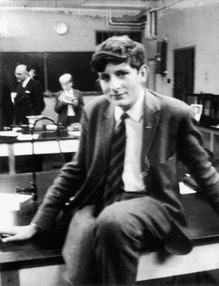Wish You Were Here (20 page)

The Hitchhiker’s Guide to the Galaxy
was published on 12 October 1979 as a Pan original, price 80p, with an initial run of 60,000 copies. That disappeared instantly. They reprinted, and reprinted again (this time at 85p), then again. Within three months the book had sold a quarter of a million units, the first hundred thousand in only four weeks, and it had been number one in the
Sunday Times
paperback bestseller list since publication. It was reviewed everywhere. Philip Oakes interviewed Douglas at length in the all-important
Sunday Times.
There was a large picture of Douglas looking cool with the caption: “Higher absurdity strikes it rich,” and a chunky headline: “Cultists find a guiding light.”
In the same paper,
Hitchhiker’s
was selected as one of the Books of the Year by Philippa Toomey (“I am deeply grateful to Douglas Adams for
The Hitchhiker’s Guide to the Galaxy,
just as good as the radio serial . . .”). Her choice was a welcome relief as most of the literati had plumped for Mary Soame’s biography of Clementine Churchill, Volume Two of the Lyttleton Hart-Davis Letters (no, honestly) or the
Memoirs of Shostakovich
edited by Solomon Volkov. Douglas was sensitive about the fact that he did not often get considered alongside mainstream “literary”—for want of a less tendentious word—material, so he was particularly pleased to be graced by that ultimate accolade of respectability: four intellectuals discussing him on Radio Three’s
Critics’ Forum
.*
115
Five months later there was a hardcover edition of the work—now a collector’s item—licensed by Pan and published by Arthur Barker, an imprint of Weidenfeld and Nicolson that specialized in library editions. (Library suppliers employed legions of nimble-fingered women on piecework who would prepare books exactly as local librarians preferred. There was a glorious inconsistency about this among librarians in different authorities.)
But on Wednesday 10 October, two days before the publication date, something happened that brought the reality home to Douglas like nothing else. By the evening of that day, when by chance he was having dinner with Terry Jones, the Monty Python, he was crazy with exuberance, quite incandescent with the knowledge of it.
As Douglas recounted this story (so it may have gained a little in transmission), Pan had arranged a signing session for him at 12 noon in London’s premier SF specialist shop, Forbidden Planet, which was then in Denmark Street in the West End. Using their usual and very reliable car service, Jacqui Graham had arranged for a driver to pick Douglas up from his ghastly flat, but as they approached the venue, the going got very slow. There were people thronging the streets in unnatural numbers. “I’m sorry, guv,” said the driver, “but we’re having trouble getting through. I don’t know what’s going on. I haven’t heard of anything on the radio. Must be a bloody demo or a march or something.”
But it wasn’t a demo, or a march. What had caused congestion in the West End that day was the huge crowd of people enthusiastically converging on Forbidden Planet to meet Douglas. A proposed one-hour signing session had fans queuing round the block, and it lasted so long into the evening that he was late for dinner. He had stopped the traffic.
It was the day that Douglas knew he was condemned to everlasting fame. He had made it.

Top right:
Douglas Adams at seven months.
Bottom left:
Christopher Douglas Adams in his mid-forties.

Janet Thrift, Douglas’s mother, at home in Dorset in 1991.

Douglas, already six feet tall at twelve, pointing out the dangers of money at the village fete in Dorset.
H. Eckardt

Douglas, age thirteen, in the chemistry laboratory in Brentwood School.

School House, Brentwood. Douglas, to the left of his house master, was conspicuous due to his height.

Top:
Douglas’s student identification card, showing him sporting a classic seventies haircut.
Bottom:
Strutting and Fretting in a student revue.
Courtesy of Martin Smith

Douglas’s Footlights membership card.
Jane Belson

Douglas, looking bashful, with Jon Canter and Lucy Parker in Cambridge, 1971.

Douglas’s unemployment benefit card.
Jane Belson

Douglas with the cast of the
Hitchhiker’s
radio series in November 1978.
Left to right:
David Tate (various roles), Alan Ford (Roosta), Geoffrey McGivern (Ford Prefect), Douglas, Mark Wing-Davey (Zaphod Beeblebrox) and Simon Jones (Arthur Dent).
BBC

Taking some time out from recording.
Left to right:
Douglas, Geoffrey Perkins, David Tate, Geoffrey McGivern, Mark Wing-Davey, Simon Jones and Alan Ford.
BBC

Marvin the paranoid android.
BBC

